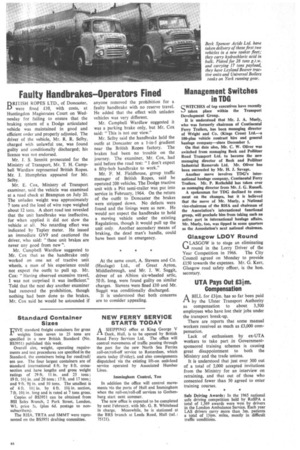Faulty Handbrakes—Operators Fined
Page 21

If you've noticed an error in this article please click here to report it so we can fix it.
BRITISH ROPES LTD., of Doncaster, .1-9 were fined £10, with costs, at Huntingdon Magistrates Court on Wednesday for failing to ensure that the braking system of a Dodge articulated vehicle was maintained in good and efficient order and properly adjusted. The driver of the vehicle, Mr. R. R. Selby, charged with unlawful use, was found guilty and conditionally discharged; his licence was not endorsed.
Mr. J. S. Sennitt prosecuted for the Ministry of Transport, Mr. T. H. Campbell Wardlaw represented British Ropes. Mr. J. Humphries appeared for Mr. Selby.
Mr. E. Cox, Ministry of Transport examiner, said the vehicle was examined at a road check at Brampton on July 20. The unladen weight was approximately 7 tons and the load of wire rope weighed about 12 tons. A short road test revealed that the unit handbrake was ineffective, for when applied it did not slow the vehicle at all. No retarding effect was indicated by Tapley meter. He issued an immediate GV9 and cautioned the driver, who said: "these unit brakes are never any good from new ".
Mr. Campbell Wardlaw suggested to Mr. Cox that as the handbrake only worked on one set of tractive unit wheels, a man of his experience could not expect the outfit to pull up. Mr. Cox: "Having observed excessive travel, I was not surprised it was inefficient" Told that the next day another examiner had removed the prohibition, though nothing had been done to the brakes, Mr. Cox said he would be astounded if
anyone removed the prohibition for a faulty handbrake with no reserve travel. He added that the effect with unladen vehicles was very different.
Mr. Campbell Wardlaw suggested it was a parking brake only, but Mr. Cox said: "This is not our view."
Mr. Selby said the handbrake held the outfit at Doncaster on a 1-in-5 gradient near the British Ropes factory. The brakes had been no trouble on the journey. The examiner, Mr. Cox, had said before the road test: "I don't expect a fifty-bob handbrake to work."
Mr. F. M. Fieldhouse, group traffic manager of British Ropes, said he operated 200 vehicles. The Dodge tractive unit with a Pitt semi-trailer was put into service in February, 1964. On the return of the outfit to Doncaster the brakes were stripped down. No defects were found and the linings were as new. He would not expect the handbrake to hold a moving vehicle under the existing Regulations, though it would pull up the unit only. Another secondary means of braking, the dead man's handle, could have been used in emergency.
At the same court, A. Stevens and Co. (Haulage) Ltd., of Great Ayton, Middlesbrough, and Mr. J. W. Suggit, driver of an Albion six-wheeled artic, 50 ft. long, were found guilty on similar charges. Stevens were fined £10 and Mr. Suggit was conditionally discharged.
It is understood that both concerns are to consider appealing.












































































































